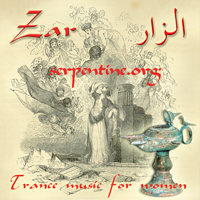Serpentine Communications
4930 Saint Elmo Ave. Bethesda MD 20814
Tel: (301) 654-2224 Fax: (301) 656-1658

| Contact Artemis |

| Contact Yasmin |

Zar thread - Egyptsearch.com
Topic: Zar rituals in Egypt
posted 26 January 2005 12:36 PM
posted 26 January 2005 12:43 PM
"The purpose of the Zar ceremony is to cure mental illness through contact with the possessing spirits which cause maladies. Though there are several methods for dealing with psychological disturbance, the Zar is the last resort which is supposed to have powerful therapeutic effect for several kinds of ailments," writes John Kennedy in Nubian Ceremonial Life. It should be noted that this ceremony is not widely practiced in Egypt."[More:
I'm guessing it's more of a "Nubian" thing
Originally posted :
It should be noted that this (Zar)ceremony is not widely practiced in Egypt."(he then referenced touregypt - my god, why????)
I'm guessing it's more of a "Nubian" thing
If it's not widely practiced in Egypt (it actually is widely practiced), but it's not more widely practiced because, like all other aspects of the traditional African religious practices, it is suppressed by the Arab Muslim ruling minority.
And yes, it is a "Nubian" thing...
Zar rituals are mostly praticed in lower class Sai'idi and Baladi communities throughout Egypt. The reason why many are praticed is either to heal or caste out evil spirits.
Most of the major partiscipants are females. Very few males lead these ceremonies,and it tends to be an outlet for women in a male dominated soceity.
quote: Originally posted :
Most of the major partiscipants are females. Very few males lead these ceremonies,and it tends to be an outlet for women in a male dominated soceity.
Was this the case throughout Pharonic times as well?
We've had this discussion back in March, my own 'two cents' was:
If you are at all familiar with Voodoo or Voudum, you know what Zar is...
quote:
"Zar, in the sense of possession, is usually, though not exclusively, inherited. It is also contagious and may strike at any time. Diriye Abdullahi, a native of Somalia, says that the zar is basically a dance of spirits, or a religious dance - kind of leftover from the old African deities, a variant of what we describe in the west as "voodoo". The old African deities were headed by two figures; Azuzar (the male, assoc. with Osiris) and Ausitu (the female, known in the west as Isis). Ausitu (or Aysitu in Somalia) is still celebrated and given offerings by pregnant women so that she will provide them with a safe birth. He describes it as a ritual dance which is mostly observed by women, especially older women. This corresponds to the practice of older African religions, in which older women were the priestesses. He maintains that younger women, especially unmarried women, are not generally thought to be "worthy of a visit by the spirit of Zar, who chooses domicile or residence in the person who is his choice."
Traditionally, women are carriers of the Zar tradition. A Zar is a spirit. Some Ethiopians and Yemenis have their own Zar, like a guide of guardian angel. The dance ritual, Zar, like other traditional healing ceremonies, as for instance practiced by the !Kung of Southern Africa, is done to regain a sense of balance and harmony in one's life and in tandem with the community.
The word Zar is thought by some to be a corruption of Jar which in the Cushitic language of the Agaw people is the word for Waaq the sky god. The Rastafarians call god Jah.
And Yah is a very old Ancient Egyptian word for God.
See also:
The Zar: Women's Theatre in the Southern Sudan,"Women's Medicine: Zar Cult in Africa and Beyond, ed. by Ioan Lewis, Edinburgh: Edinburgh University Press, 1991
from my own experiences...
quote:
As an African American, born in (Voodoo) Louisiana...
One of the first things you learn as a Black youngster is that when you go to church on Sunday, DO NOT SIT NEXT TO A WOMAN, especially a middle-aged one. When this "zar spirit" hits one of these women (it usually affects several women almost simultaneously), they begin to gesticulate and shout out loud. They then, usually, make their way to the church's aisle where they begin to dance themselves into a trance like frenzy, eventually feinting or becoming rigid, where they have to be fanned and literally carried out of the auditorium. And your biggest fear is that this spirit might also hit you!
...we call this the Holy Ghost in (Voodoo) Louisiana.The only thing missing is some formalized ritual, which obviously isn't necessary.
and from EW Budge on Ancient Egyptian Voodoo
quote:Honestly, I have found little evidence of the zar ritual in ancient Egypt. However, it could have been a pratice amungst the commoners instead of the priesthood. We have very scant evidence of the daily activities of the non-elite Egyptians. What little evidence we have comes from the texts of the workmen/women of Deir el-Medina which was a village of craftworkers in ancient Egypt.
It was well known in Egypt and the Sudan at a very early period that if a magician obtained some portion of a person's body, e.g., a hair, a paring of a nail, a fragment of skin, or a portion of some efflux from the body, spells could be used upon them which would have the effect of causing grievous harm to that person. --Legends of the Egyptian Gods, EW Budge, p.xxxiv
Well it would seem that evidence of Zar rituals would be scarce even today. You wouldn't document putting a Hex on someone. But I've seen a number of ancient Egyptian references to the use of spells. I have a documentary which notes Egyptains using spells on people dating from the Roman occupation. I'll get you the name of the name of it later.
